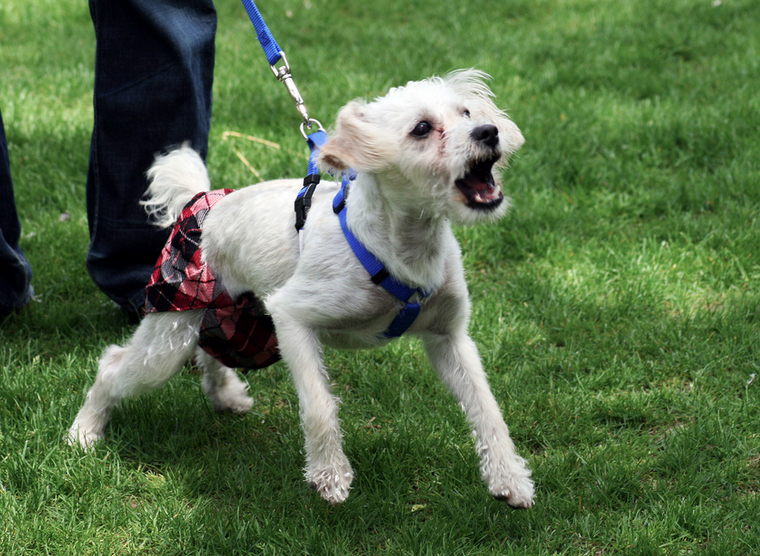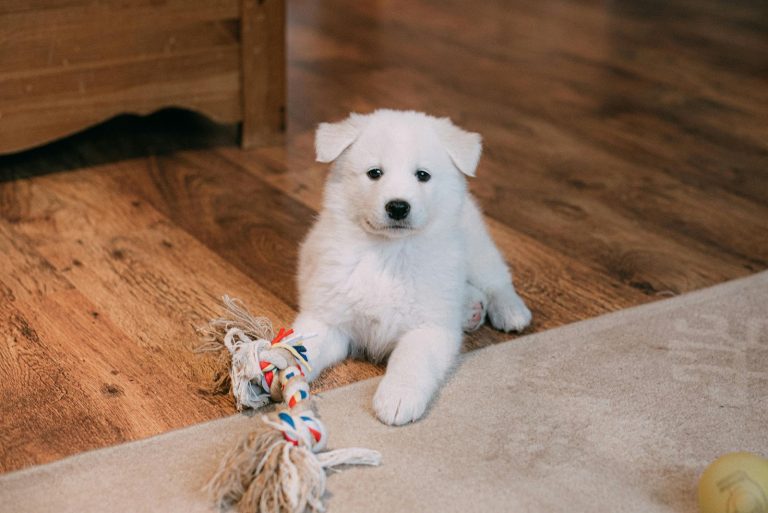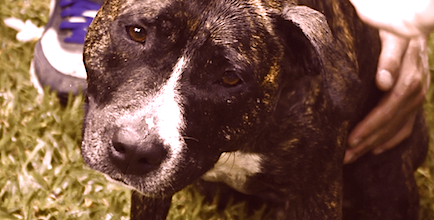Dog Barking Too Much? Here’s What You Can Do About It Right Now.
Does your dog bark so much that it’s driving you (and your neighbors) crazy? Read on for some expert training advice.
This article about dealing with a dog barking too much was written by professional dog trainer and behaviorist Jonathan P. Klein, CDBC, CPDT-KA, as well as dog trainer Clarissa Fallis. Dog behaviors writer Melissa Smith, who is a professional dog walker and pet sitter, also contributed. This article was last updated on May 29, 2024

Is your dog barking too much?
Dogs usually bark when they have a reason to do so. There’s something they need to communicate to the world.
- A warning: “Hey! Get off my territory!”
- A greeting: “Hi, Mom!”
- Sheer excitement: “Oooooo, I smell treats!”
These are logical reasons, but in some cases, dogs seem to bark for no reason. They just bark — constantly. You’re probably frustrated and thinking, “My dog barks at everything!”
This can cause problems for both you and your dog.
The police may even be called to your house — your neighbors may not be so neighborly when they’ve had to listen to your dog bark for hours on end.
- Breed-Based Instincts and Dog Barking
- My Dog Barks on the Leash at Other Dogs
- My Dog Barks at the Doorbell
- Dog Barking Due to Stress
- Loneliness and Boredom as Causes of Dog Barking
- My Dog Keeps Barking at Me
- Finding the Right Solution
- Final Tips to Stop Dog Barking
- But Wait! What About My Angry Neighbor?
- Frequently Asked Questions (FAQ)

Don’t leave your pet’s safety to chance
Sign up for Petful recall alerts today.

Breed-Based Instincts and Dog Barking
Certain dog breeds are simply more talkative.
Hounds and Beagles tend to howl, for example. Also common are barky Goldendoodles and Poodles of all varieties.
That said, based on anecdotal experience, excessive barking seems to be human-caused.
We just don’t breed dogs to bark nonstop — well, maybe with the exception of a Dalmatian, who was bred to run and bark along with a fire wagon.
Although you may have a breed of dog that barks a bit more than others, you can take charge of the problem by learning what it is that is stimulating your dog.
So how do you stop nuisance barking?
For starters, it’s important to decipher why your dog is barking too much. Depending on the motivation and type, the solution will vary.
My Dog Barks on the Leash at Other Dogs
It’s easy enough to diagnose territorial barking.
If the dog is typically barking only when they are at home (i.e., their territory) or barking at dogs and people during walks, chances are it’s territorial barking.
On walks, these dogs should always be wearing a head collar on a walk so the handler can get control of the dog quickly. Leashes and collars are not a natural thing for dogs to wear, so it’s important to acclimate your pet to these tools from a young age. You don’t want the leash and collar to be something that restrains the dog — this is how leash frustration is born.
In our experience, the majority of dogs who show improper leash manners are not aggressive, just frustrated. The term “leash frustration” better describes this phenomenon.

Here’s some advice on preventing a dog from barking on the leash at other dogs:
Burn Off Energy Before Walks
When teaching a young dog to walk on a leash, it’s helpful to let them burn off some energy first.
Make a habit of always playing with your dog before the walk, and use the walk as a relaxing way to see the world and not as the dog’s main form of exercise. It is much easier to stop dogs from pulling on the leash when they are already nice and tired. Pretty soon they will associate walks with calmness and not excitement.
When you encounter other dogs, don’t make a big deal of the situation:
- If your own dog is behaving appropriately you can let your dog say hi to the other dog in a calm manner.
- If your dog is not behaving appropriately, use the leash and collar to redirect their attention forward and continue your calm walk.
If you start properly when you get your new puppy, you will have a lifetime of fun walks to look forward to.
It’s Not Too Late to Train Your Dog
And if your dog is already at the point where they are exhibiting leash frustration, it is not too late. Follow the same advice of always giving plenty of exercise before the walk to tire them out, and then focus on making your walks uneventful by staying calm when you encounter other dogs along the way.
The easiest way to overcome bad habits is to have a set schedule where you have a successful encounter with another dog at least twice a week. Do this by recruiting a neighbor or friend to bring their pet outside while you practice.
Give yourself plenty of training time so you can walk your dog past the new dog over and over until yours starts showing appropriate behavior. When you finally achieve good behavior from your dog, you can then continue your walk.
Your dog’s last memory of the new dog will now be a calm one — which will make your next encounter easier.
Every time you end on a good note, your dog will start to associate new dogs with calmness and not frustration.
It’s important to address these behaviors before they turn into actual leash aggression.
My Dog Barks at the Doorbell
Does your dog go nuts when the doorbell rings or when there is a knock at the door? This is another form of territorial barking.
OK, so you’re wondering: How do I train my dog not to bark at the door?
The best way to eliminate territorial barking is through counterconditioning:
- Offer the dog a high-value reward every time someone enters the dog’s “territory.”
- Soon, the dog will begin to think that the presence of the intruder yields a reward.
In this video, trainer Pia Silvani offers one method of teaching a dog a “quiet command”:
Dog Barking Due to Stress
A dog who is dealing with a stressful situation, such as a move, may bark more.
Being a country dog and moving to the city, for instance, might cause something — it’s the stress of the change.
Stressful situations could also include a new member of the household — whether that’s a person or an animal — or a sudden change in routine (you used to work days but started working the midnight shift, for example).
With any new situations, your dog simply needs time to adjust.
Loneliness and Boredom as Causes of Dog Barking
Dogs share a wide range of emotions with us, and that includes loneliness.
Some dogs simply don’t like to be alone, and this is expressed in constant barking. So how to stop dog barking when left alone?
If your dog misses you, your absence could be the key to this barking problem. The dog is looking for your attention. Try to spend more time with them. And don’t leave them outside when you have to leave them alone.
If you think your dog may be barking out of boredom, and there seems to be nothing stimulating the dog to bark, first rule out any medical problems. Some dogs bark when they are in pain, so have your vet check him out for common problems — such as ear infections, anal sac impaction and urinary tract infections.
If the vet clears the dog, and the barking continues without any obvious stimulation, it may be out of boredom.
Here are some more tips to help:
- Walk or run the dog daily until the dog is panting heavily. This may be a 2-mile run if needed.
- If you don’t want to actually run the dog, try getting a WalkyDog Exerciser Leash to bike your dog safely.
- Your pup also may need some mental stimulation, which can come most easily in the form of training. Try a puzzle-type toy to keep your dog mentally stimulated.
If you’re wondering how to stop a puppy from barking at night, this article may be of help.

My Dog Keeps Barking at Me
This is learned barking — although “demand barking” is probably a better name for this, because typically it’s exhibited by dogs who bark more at their humans than at other people and appear to be demanding things.
To control this, you and everyone in the household should stop giving the dog what they want when they bark.
If your dog starts demand barking for something like attention, to play fetch or to go on a walk, you and everyone who interacts with the dog must completely ignore your pet and maybe even turn away.
Then offer the dog what they want when the dog isn’t barking.
Also, as much as you want to correct the dog, don’t. Dogs who demand things from us are typically dominant and have been shown that being dominant is OK. It’s not. If you physically correct this dog, the behavior may escalate to jumping or mouthing.
Finding the Right Solution
Look at and eliminate the cause.
Here are some questions to ask yourself when you think your dog is barking too much:
- “Does the dog need more confidence?”
- “Does he need “to learn some degree of comfort being alone?”
- “Is there a barrier frustration issue, such as fence or crate barking?”
- “Is something going on that the dog is reacting to (construction noise, neighbors, schoolyard, etc.)?”
Trying to suppress the barking through forcible means won’t help — and may cause your dog even more stress.
Please, no collar corrections, no ultrasonic bark preventers. All of those only suppress the symptoms, not make the dog able to live comfortably.
- Confidence-building exercises, cognitive games or toys, and enriching the environment all might help.
- For barking at family members, teaching the dog to settle on a mat, wait for attention and to accept some degree of separation is important.
- For outside noises, try simply closing the drapes. If your dog can see people walking by, the dog is going to bark at them. You can’t remove interesting noises from outside, but you might be able to keep your pup in a quiet room during the day, where they’ll be less prone to hearing or seeing exciting things.
Final Tips to Stop Dog Barking
Reinforcement of Alternate Behaviors
Reward your pet for exhibiting behaviors other than barking. Reinforcing alternate behaviors for dogs that exhibit learned barking is crucial.
Even dogs who display other types of barking should be rewarded when they are calm and quiet.
Management and Setting Up for Success
One possible solution is to ignore the behavior. The barking will most likely escalate before the dog stops and gives up. This escalation is called an extinction burst.
In the case that the dog demand barks for certain items, keep toys and chew items out of sight until a playtime is designated. Offer the toys or a chew item on a specific mat. Now you are controlling the desired items.
Consequences
Use a consequence only if you are rewarding alternate behaviors as well and you are implementing leadership exercises.
Some common consequences are a 30-second timeout in an enclosed room, a squirt with water or a shaker can. Here’s an opposing viewpoint on shaker can correction.
Consistency
Because most behaviors are self-rewarding behaviors, you need to stay consistent when treating any behavior problem.
If there is more than one person in your household, everyone must enforce proper behavior. Dogs respond very well to consistency — they are happier and calmer in an environment where the rules are consistent.
A dog who “barks too much” can indeed be annoying, but by determining the underlying factor and treating the cause, implementing the treatment plan, and running through some leadership exercises, you should have success in stopping the problem.
In summary, a dog barks for a wide range of reasons. Take the steps to determine the cause, and then handle it with appropriate training.
For one-on-one help, contact a credentialed dog trainer or animal behaviorist in your area.

But Wait! What About My Angry Neighbor?
Tamar Love Grande, former associate editor here at Petful, has fostered literally hundreds of dogs over the years.
The following is her advice for dealing with a neighbor who’s upset about your dog barking:
“We have 5 dogs right now, as well as various fosters and boarders, so I know how annoying a barking dog can be. Yes, dogs bark, but there’s no reason they need to bark and bark … and bark and bark and bark!
“Because I don’t want Animal Control visiting me — or my neighbors rising up against me with pitchforks and torches — I work hard to keep my dogs quiet. Part of it is training them to shut up when I tell them to, but the rest is all about managing the situation before it explodes.
“My advice: Bribe your neighbors!
“The first thing I did when we moved into our house was visit my neighbors to introduce myself. I brought homemade cookies and let them know that I was very serious about keeping my dogs quiet.
“I explained that we foster and board dogs, so it might seem like we have a lot of them, but they’re only temporary. I let them know that if they ever feel we’re making too much noise, I really want them to tell me so I can work harder to keep the barking under control.
“I highly recommend this approach to anyone with dogs, especially people living in apartments, where the walls are usually thin. If your neighbors aren’t home when you come by, leave them a handwritten note with your phone number.
“If your neighbors have already complained, then you’ll need to do some damage control. I have found that nothing disarms people like a sincere apology and a promise to fix the problem. Using the cookie-and-handwritten-note approach, explain that you’re aware there’s a problem and are very sorry about the inconvenience. Tell them you’re working on the problem, but it might take a few days.
“Don’t forget to bribe them with homemade or fancy store-bought treats.”
Frequently Asked Questions (FAQ)
How to stop dog barking in seconds?
To stop dog barking in seconds, use a sudden, distracting noise or command like “quiet” and immediately reward the silence.
How to stop a dog from barking?
To stop a dog from barking, identify the trigger and use consistent training techniques like positive reinforcement to address the behavior.







